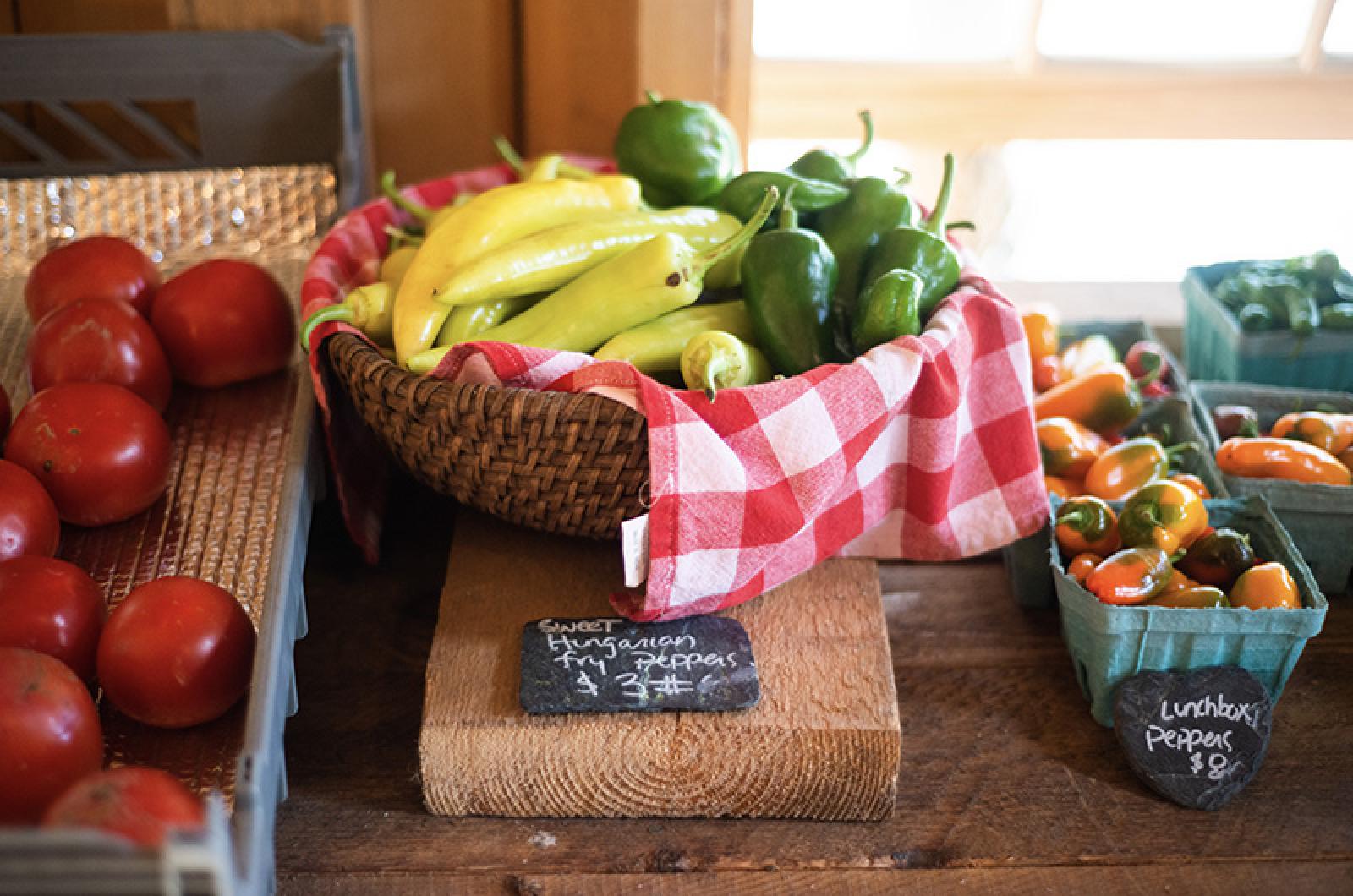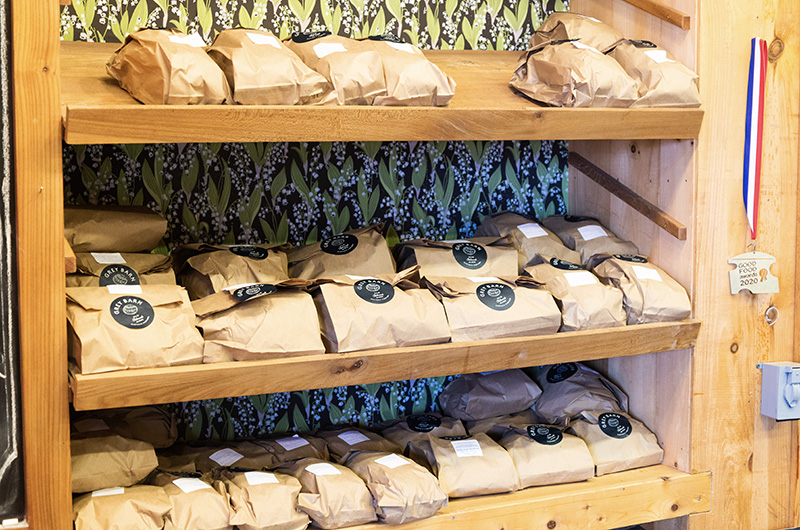Last week, here in the hinterlands of West Tisbury, a serious frost — actually more like several hours of freezing temperatures — finished off my zinnias, tomatoes, peppers and beans. A lone borage plant, some garlic chives, and the death-defying Petroselinum crispum (yes, parsley) were about all that survived inside the fenced vegetable garden.
Discouraged by the black, droopy plants staring at me, I took myself off to the West Tisbury Farmers’ Market on Saturday. It was the first of the three 10 a.m. to 1 p.m. markets that will extend the outdoor market through October. There will be no indoor winter market this year.
The fairgrounds were wet and puddly; the wind just eager enough to be annoying, though barely more than a breeze by Vineyard standards. Still, I noticed there were fewer vendors and a much smaller crowd. Not that there’s anything wrong with either of those things — it was just evidence to me of the growing season winding down.
Oh, if we all just had hoop-houses and greenhouses — and very large freezers. (My sporadic pursuit of a chest freezer has been thwarted at every turn.)
I was a tiny bit verklempt over the notion of waning local food, and wondering how so many others who had tightened their connections with farmers and fishermen on the Island this year were going to handle this transition.
“It was definitely a year when people had a certain interest in where their food came from,” Lydia Fischer of The Garden Farm told me when I stopped to buy some habanada (sweet not hot) peppers at her booth. “The season went fantastically well,” she added, dipping into her truck for a sweater.
Hearing that made me happy. My spirits began to lift as I wandered over to the North Tabor Farm booth to chat (through-the-mask chat) with farm owner Rebecca Miller. Her news was even better: their new farm stand was such a hit this summer that they plan to stock it all winter. The enclosed structure, closer to the farm than their old stand and with much better parking, had materialized at a crucial time when ordinarily North Tabor would have been sending much of their produce to restaurants. Not this year. “We had to pivot our entire business from wholesale to retail, and I’m just so grateful to our customers for all their support,” she said. “The farm stand business was beyond what we could have imagined. At one point, we sold the meat from three pigs in two weeks time.”
“We’re raising three more pigs right now, and we’ve got 100 meat chickens. Our two greenhouses have collards, beets, spinach and bok choy in them which we’ll harvest as far into the winter as we can,” she said.
Rebecca hopes to fill the farm stand with sauces and other ingredients that can augment their own meat and vegetables to create a one-stop dinner shopping opportunity on North Road. She’s already reached out to other Island farms and makers who might want to sell their goods in the stand this winter, and she intends to contact New England distributors, too.
“No one has any more onions, and everyone wants onions!” she lamented. Who knew onions would be such a popular pandemic crop?
I left the market feeling better, reminding myself that we’re truly lucky to have farms that are willing to push the season as long as they possibly can. And some of those farms, like Morning Glory and Island Grown Initiative’s Thimble Farm, are the same ones that continue throughout the fall to channel food to gleaners, preservers, school chefs and pantry stockers, who in turn feed a lot of hungry people. Island Grown Initiative’s Mobile Market is actually on the road through February.
Another day I stopped at the Grey Barn Farm, where all summer the parking lot has been jammed and the line into the farm stand considerable. I was relieved to see only a short line; I had just enough time to admire the baby cows. Later I got a chance to chat with farm co-owner Eric Glasgow, who assured me that not only would they continue to be open year-round, but that they had plans to renovate the existing farm stand come the first quarter of 2021.
“Clearly this summer, with all the lines, we were straining against the infrastructure,” Eric pointed out. He and his wife, co-owner Molly Glasgow, would like to address the circulation and parking, add some refrigeration, and generally make the farm stand area more accommodating.
In January, they will temporarily relocate the farm stand to the big barn building that houses the bakery, but since that location will not lend itself to being self-serve (as they would normally do over the winter), they may have to trim back a day or two from their seven-days-a-week, 8:00 a.m. to 5 p.m. current schedule.
At the same time, they’re hoping to bump up the bakery production a bit, perhaps even offering croissants five days a week (hurrah!). And they’d like to add a second CSB (Community Supported Baking) this winter to allow folks to choose one of two days to pick up their pre-ordered and pre-paid bread every week.
The output from the bakery and the vegetable fields, as well as a huge demand for local meat, increased Grey Barn’s retail sales significantly this year, a fortunate circumstance since the national wholesale market for their cheese lapsed into radio silence during the early days of the pandemic. Raw milk sales at the farm stand shot up as well.
Like other farmers, Eric and Molly saw so much demand for meat starting last spring that they blew through their inventory at warp speed. In August, Eric processed three more cows and brought in summer-friendly cuts like kabobs and steaks; that beef sold out in two weeks.
So while Eric is confident that they’ll keep the farm stand stocked with a variety of farm-grown and made ingredients through the winter, he cautioned that “they won’t have everything all the time.”
That reminded me how important it is to be flexible as a farm-stand shopper. If you want locally grown food, you might have to buy arugula when you wanted spinach. Maybe lamb meatballs with local feta cheese would be a nice change-up from beef and parmesan.
I had the same thought when I talked with Coco Brown at Ghost Island Farm the next day when I went to pick up Island-grown Asian pears, salad mix, and late tomatoes. She said their strict adherence to an online ordering system worked very well this summer and that they will continue to do that through December and when they reopen in February on weekends after a short break. (Again, hurrah for local greens and other goodies in the winter.)
“It isn’t for everyone,” she said of the system, adding that for the majority of shoppers it had been a smooth ride.
It’s true that when it comes to local food, you may have to shift gears occasionally, but by now most of us are in that groove. As Mick would say, you can’t always get what you want, but if you try some time you find you get what you need.





Comments
Comment policy »